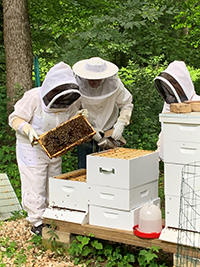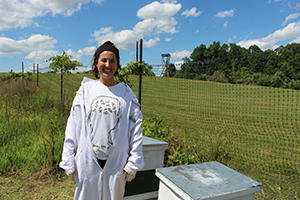There is so much more to honey bees than producing honey, and at George Mason University, nobody knows that better than the team at the Honey Bee Initiative. Founded in 2013 by Lisa Gring-Pemble and Germán Perilla, The Honey Bee Initiative (HBI) is a program operating out of the Business for a Better World Center of the School of Business. “The Honey Bee Initiative was established at Mason with two main purposes in mind: educate the Mason community and general public about the importance of pollinators and their relation with food security, and to develop a self-sustainable program that will give us the possibility to implement the model anywhere in the world,” says Perilla. Perhaps most importantly, HBI puts those programs into action, enhancing the environment of those in need.

While the HBI was founded by professionals with deep understanding in the workings of the honey bee, their volunteers have also become virtuosos on the subject. Alessandra Castaneda, BIS Individualized Study ’19, and English Department Chair Debra Lattanzi Shutika both volunteer with the Honey Bee Initiative and are ardent advocates for the honey bee. “Here we have these tiny creatures that we can learn so much from,” says Castaneda. “Everyone is welcome to come and learn in an inviting and hands-on environment at the Honey Bee Initiative.” Castaneda has also ventured to Colombia with the group as part of their mission to drive positive change in indigenous and rural communities, with special emphasis on women and children. By reintroducing honey bees to the environment in the Colombia village, HBI develops a sustainable social enterprise to improve the community’s wellbeing. “The international programs have three modes of action: community driven development; alliances among the local governments, private sector, and communities; and sustainable development,” says Perilla. Debra Lattanzi Shutika has taken her love of honey bees home with her, quite literally. “I went out and got my own hives and I’ve been working with the neighborhood kids while educating them on the importance of the honey bee,” she says.

Mason is known for its collaborative spirit with organizations both internal and external. “We were mindful that bees are the perfect interdisciplinary insect and we have collaborated with many campus partners on everything from research to developing business models to creating products made from honey,” says Gring-Pemble. With so many collaborative purposes served by the HBI, it is emblematic of the wide range of impact of the honey bee. “By learning about the critical role of bees, I also learned much about the local environment and ecology,” says Shutika. Castaneda adds, “I tell people to picture a grocery store and then think about how much of it was pollinated by bees.”
Anyone associated with the Honey Bee Initiative understands that the spread and production of honey bee populations translates to a richer environment stocked with the nutrition that everyone depends upon. By taking their mission internationally, HBI is doing its part to make the world a better place, through ecology and through the economy. Your support to the Honey Bee Initiative enables students, faculty, staff, and other volunteers to continue on their mission in helping environments—both local and international—prosper, and in turn enriching lives of the populations dependent on them.
